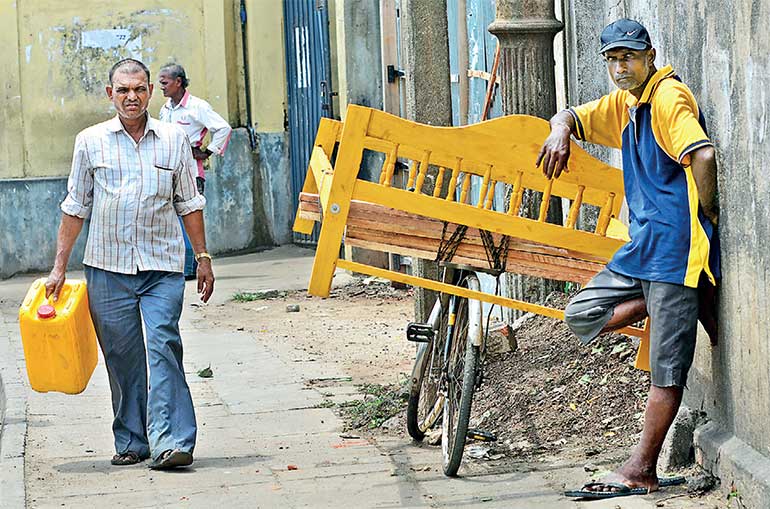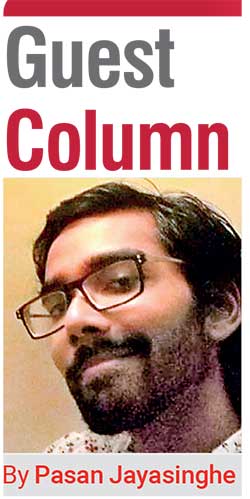Thursday Feb 19, 2026
Thursday Feb 19, 2026
Monday, 9 January 2023 00:40 - - {{hitsCtrl.values.hits}}

The Budget’s goal of reaching a primary surplus through increases in regressive taxes and decreasing state expenditure, particularly in core areas like health and education as well as welfare subsidies (in real terms), will impact the working class and the poor the most – Pic by Shehan Gunasekara

According to Ranil Wickremesinghe and his supporters, stability has transpired in Sri Lanka since his Government was formed. This article attempts to interrogate this stability from an economic policy viewpoint, looking at the 2023 Budget as the centrepiece of the Government’s economic policy agenda and reception to it by the country’s economic establishment. This unearths numerous contradictions in the construction of ‘stability’ which show that the stability that has been created has instead been in normalising austerity, neoliberal economic discourse and state repression. Ultimately, this stability will not protect ordinary Sri Lankans from the devastating impact of the crisis.
Austerity as stability
Presented explicitly as an “IMF Budget”, the 2023 Budget proceeds to impose then normalise an accelerated austerity. Its diagnosis of the budget deficit as the primary issue facing the country and its foremost goal of reaching a surplus by 2025 is most telling of this. It aims to achieve this by increasing state revenue – mainly through tax increases and state-owned enterprise (SOE) privatisations – and decreasing state expenditure (except in areas such as defence and road infrastructure), complemented by provisions to enable debt restructuring and the repayment of loans.
At this moment of unprecedented crisis, however, the 2023 Budget is a hopeless, enraging document. It provides no coherent plan of immediate relief or food security to protect the millions of Sri Lankans who face the onslaught of the economic crisis. According to the World Food Programme and the Ministry of Health itself, over 30% of households in the country are food insecure and a staggering 42% of children under 5 years are suffering from malnutrition. In response, the Budget actually reduces allocations to the Ministry of Agriculture, which will only exacerbate the fall in domestic food production. Coupled with still astronomical food inflation, increases in goods and services taxes such as VAT, and hikes in electricity and water tariffs, the burden on the working class and poor Sri Lankans to merely survive at subsistence is immense and surely unbearable.
The Budget’s goal of reaching a primary surplus through increases in regressive taxes and decreasing state expenditure, particularly in core areas like health and education as well as welfare subsidies (in real terms), will both impact the working class and the poor the most. Off the hook are the richest, spared any taxes on their wealth, and corporates who also largely escape liability for corporate taxes. The latter can savour this alongside the range of existing taxpayer-funded import concessions and tax exemptions (including BOI tax holidays). This is even as they continue to sparingly repatriate their overseas earnings and engage in mis-invoicing and transfer pricing schemes which deprive the economy of billions in much-needed foreign exchange.
The Budget then, signals no change in Sri Lanka’s economic status quo, where the instigators of the economic crisis – a corrupt business elite and a political class in collusion – are shielded from accountability and in fact rewarded for it, whilst its most vulnerable victims – working and poor Sri Lankans – are punished and driven into further misery. This is indeed the logic of austerity, which the Budget seeks to normalise as the new stability, alongside its effects: further degradation in the living standards of the working class and poor Sri Lankans.
|
President Ranil Wickremesinghe
|
Neoliberal economic discourse as stability
Despite its fatal inadequacy, however, the Budget was received very positively by Sri Lanka’s economic establishment, consisting of much of the country’s business community, economists and think tanks, on account of its comprehensive acceptance of IMF objectives.
This should not be surprising. In Sri Lanka, there is almost dogmatic fervour among the economic establishment for “necessary reforms”. Such reforms centre on further liberalising the economy through privatising state assets, liberalising trade, relaxing labour laws, and reducing state expenditure.
There has also always been a silent agreement among the political and economic elites of this country that the actual costs of these “necessary reforms” will be borne by the poorest. Such unilateral enthusiasm for the IMF and its attendant austerity makes the Sri Lankan economic establishment unusual in the global south. This is especially so for a country with a multi-decade engagement with the IMF and very little to show for it, not even some minimal immunity to a full blown economic crisis.
This alignment does, however, explain how the economic establishment has now largely become a mouthpiece for the Government. It simply propagates neoliberal economic discourse to normalise austerity. For instance, the ‘independent citizens’ movement’ “Godayamu”, which is actively funded by the Ceylon Chamber of Commerce and fronted by various economists and professionals, chides ordinary Sri Lankans for being too dependent on Government ‘handouts’ whilst advocating drastic neoliberal reforms. Essentially an elaborate PR campaign for the Government’s economic agenda, “Godayamu” repeats the trope of blaming working and poor Sri Lankans for the crisis and shaming them into accepting the horrendous brunt of neoliberal reforms as penance and punishment.
This can also be seen in how the economic establishment response to the Government’s highly opaque dealings with the IMF. The Government refuses to make public the staff level agreement it reached with the IMF, even to Parliamentary Oversight Committees. It is apparently only after a final agreement with the IMF is reached that its full terms can be learned, despite such terms being actually being implemented right now under the 2023 Budget and pre-Budget tax and labour law reforms. This leaves those impacted by these policies, particularly those at the crosshairs of SOE, taxation and labour law reform, profoundly in the dark.
The Sri Lankan economic establishment, however, appears completely unbothered by this lack of transparency, with some openly defending it as “routine practice”. This is despite many of the same people decrying opaque and arbitrary economic policymaking during the Gotabaya Rajapaksa administration. The economic establishment’s selective silence around the terms of the agreement shows its desire for the public to remain ignorant and not demand any pushback on the reforms or relief from their impact.
It displays, in fact, little acknowledgement overall that the Government is actually engaged in a negotiation with the IMF and that whatever leeway exists on the negotiating table must be used to provide real protections for the most vulnerable. Instead, its zeal for “necessary reforms” means there is instead an almost unspoken fiat that the Government is duty bound to accept all of the IMF’s terms in full.
Repression as stability
The most concerning blind spot of the economic establishment in this regard has been towards the Government’s full-scale repression which accompanies its implementation of austerity. The Wickremesinghe Government continues its mission from the outset of targeting Aragalaya protestors and clamping down on protests using the state’s full repressive apparatus. Yet far from being disturbed by this repression, the economic establishment prefers to keep silent or even tacitly endorse it. Numerous Business Chambers have called for citizens to stop protesting because it would ‘destabilise’ the economy. A key “Godayamu” advocacy planks is also discouraging ‘destructive dialogue’ (i.e., protest).
Perhaps the most revealing threading of these strands of stability in austerity, neoliberal economic discourse and repression came early in the Wickremesinghe presidency, with the Advocata Institute’s “#ReformNow” conference held in August 2022. The conference featured numerous top economists all advocating for, and outlining how to speedily implement, “difficult but necessary” reforms. At the exact same time as its keynote speech was being delivered by none other than Wickremesinghe himself, the Police were clearing the continuous protest site at Galle Face, GotaGoGama, under a Government directive. During the same week, there were also multiple extrajudicial abductions of protestors and the arrests of many more. The dissonance here was perhaps unnoticed by participants at Advocata’s glittering conference, but from the outside, it is fairly plain how the economic establishment was readily participating in creating a new stability of repression through their silence and complicity.
Such dissonance will only grow as the full impact of the Budget and its austerity hits. Wickremesinghe’s effective dismantling of the Aragalaya protests was in many ways a test run for any future protests by trade unions and citizens attempting to resist austerity measures. Indeed, the Government has already begun harassing trade unionists such as those at telecom unions resisting privatisation and downsizings. This can be expected to intensify once again to arbitrary mass arrests and police brutality, alongside lashings of tear gas and water cannons. In many ways, the Government’s repression cannot be easily separated from its economic policies, for the latter requires the former. The Government then seeks to normalise a background level of such repression as ‘stability’.
The economic establishment will ably assist the Government in this endeavour. It will continue to socialise “necessary reforms” whilst silently or openly endorsing portraits of ‘instability’ and ‘violence’ against those resisting and painting opposition to austerity as deviant and punishable. But ordinary Sri Lankans suffering under this crisis will only be able to tolerate the disparity between their worsening daily lives and the idea of stability for so long. When this stability collapses, the Wickremesinghe Government, and the economic establishment in particular, will need to find far better narratives to pin their destructive agenda on.
(The writer is a PhD candidate in political science at University College London.)